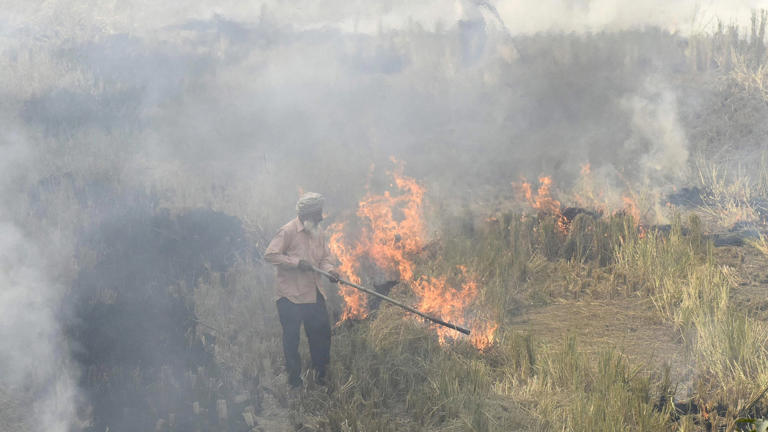Stubble Trouble: DCs, SSPs Get Show-Cause Notices As Farm Fires Go Unabated In Punjab

Stubble Trouble: DCs, SSPs Get Show-Cause Notices As Farm Fires Go Unabated In Punjab
The government has initiated action against officials in Punjab for their perceived failure to curb the incidence of stubble burning. Show-cause notices have been issued to deputy commissioners (DCs) and district police chiefs as a response to the continued occurrence of farm fires in the state. On Thursday, nine DCs received show-cause notices, and on Friday, the same action was taken against 11 senior superintendents of police (SSPs).
The notices were reportedly issued based on the observation that there were more than 100 incidents of stubble burning in a day in the districts of Barnala, Sangrur, Bathinda, Muktsar, Faridkot, Ferozepur, Fazilka, Ludhiana, and Moga. The move indicates the government’s concern and determination to address the persistent issue of stubble burning, which contributes to air pollution and environmental degradation.
The issuance of show-cause notices to officials reflects an attempt to hold them accountable for their perceived inability to effectively control and prevent stubble burning. Stubble burning has been a recurring problem during the post-harvest season, leading to increased air pollution levels and adverse health effects.
As the government takes these measures, it signals the urgency to address the environmental challenges associated with agricultural practices and the need for coordinated efforts to find sustainable solutions. The effectiveness of these actions and their impact on reducing stubble burning incidents will likely be closely monitored in the coming days.
The government’s show-cause notices to deputy commissioners (DCs) and senior superintendents of police (SSPs) in Punjab underscore the serious concerns regarding their alleged failure to implement effective measures to curb stubble burning. Reports indicate that the notices specifically addressed the DCs’ failure to implement an action plan aimed at reducing the incidence of stubble burning and their lack of action against field officers responsible for overseeing and managing these issues.
Similarly, the SSPs of various districts, including Barnala, Bathinda, Jagraon, Khanna, Sangrur, Muktsar, Moga, Ludhiana, Ferozepur, Faridkot, and Fazilka, have also received show-cause notices. The government’s move suggests a comprehensive review of the performance of both administrative and law enforcement officials in addressing the persistent challenge of stubble burning.
The notice’s focus on the lack of implementation of action plans and the failure to take action against field officers indicates an expectation of proactive measures at both strategic and operational levels to mitigate the environmental impact of stubble burning. Stubble burning has been a longstanding issue in the region, contributing to air pollution and posing health risks.
![]()
The issuance of show-cause notices represents a mechanism for holding officials accountable for their roles in managing and curbing stubble burning. As the government takes these steps, it reflects a commitment to addressing environmental concerns and underscores the urgency of finding effective solutions to reduce the practice of stubble burning in the agricultural landscape of Punjab. The responses and actions taken by the officials in question will likely be closely monitored in the ongoing effort to tackle this environmental challenge.
The government’s efforts to address stubble burning in Punjab have involved a multifaceted approach, including awareness campaigns and enforcement measures. According to official information, the police have conducted approximately 7,000 meetings with panchayat leaders to raise awareness about the adverse impacts of farm fires on soil and the environment. Additionally, around 1,000 joint flying squads comprising both police and civil officers have been formed to actively monitor and prevent the incidence of stubble burning.
In terms of enforcement actions, official agencies have reportedly imposed fines amounting to Rs 1.42 crore on farmers found violating orders against burning paddy crop residue. These fines are part of a strategy to deter farmers from engaging in the practice of stubble burning, which contributes significantly to air pollution and environmental degradation.
Despite these efforts, the state has witnessed over 33,000 incidents of farm fires during the current paddy season. The reported cases on Saturday alone numbered around 700, following 1,150 cases on Friday and 1,271 on Thursday. The persistence of farm fires is attributed to the ongoing paddy harvest in the state.
The continued occurrence of stubble burning highlights the challenges associated with changing agricultural practices and the need for sustained efforts to incentivize alternative methods for managing crop residue. The government’s combination of awareness campaigns, enforcement actions, and fines underscores the importance of a comprehensive approach to address the complex issue of stubble burning in the region. Ongoing monitoring and intervention will likely be crucial in achieving a sustainable reduction in farm fires and mitigating their impact on the environment.





